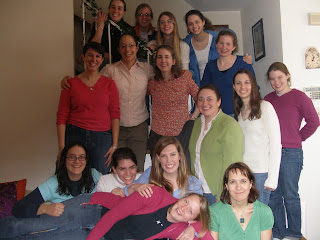From "The Journeying" 1992:
"In
Notre Jeunesse, Peguy (Charles Peguy, French writer and poet, Ed.) said: "An event is always whatever is most unexpected". An event, then, is "something" which suddenly introduces itself: the unpredictable, the unforeseen, the non consequence of factors antecedent. In fact, the word closest in meaning to "event" is "chance" ("Circumstance"): the word "chance" describes something that is there but our eyes as they watch it happen can find no explanation for it. So we can say that as far as our reason and our faculties are concerned, an event is purely and ultimately a thing of chance. Moreover in terms of our capacity for inquiry and understanding, an event is an event precisely to the degree that it is elusive - if there is something about it that escapes us.
It is typical of an event to be unpredictable and unforeseen ( it is unforeseen in that, by its nature, it is unpredictable). So, that which has the power to clarify me to myself is something which penetrates the horizon and the atmosphere of my existence like a strange, alien meteorite that I could not foresee or ultimately, therefore, understand since the unforeseen is by no means comprehensible.
So it is the incomprehensible, the unpredictable that sheds light - like a struck match - on our true selves. It is because of the intrusion of this irrational and alien "thing" - that our reason cannot grasp and our measure cannot master because it goes beyond, it breaches all our measures, this thing which does not derive from our thoughts, however clever we might be - which in the darkness of our existence begins to enter, shedding light on our true selves and which starts bringing order our of confusion. And it is from this point that an attraction and an affection in our own regard start to take form, then comes a tenderness and the possibility of compassion for others, then a serious attitude to plans for today and above all for tomorrow.
Let us stress this point. Commenting on the phrase quoted above, the French critic Alain Finkielkraut says this in his book on Peguy: "An event is something which erupts from the outside. It is something unexpected. And this is the supreme method of knowledge ". (Learning is finding ourselves before something new, something foreign to self, something that self has not constructed). We must restore to the event its ontological dimension of a new beginning. It is an eruption of the new, that breaks the cog-wheels (things already established, the definitions already provided), that sets a process in motion.
...Besides the face of Jesus the Christian event typically assumes human faces, the faces of companions, of people like you and me. In the same way in the villages of Palestine he could not get to, Jesus acquired the faces of the two disciples he sent, he was present in the very faces of the two he had chosen. And it was exactly the same thing: "Master, that which you made happen we also made happen". Identical. "The Kingdom of God is at hand. The Kingdom of God dwells among you"...
...The event of Christ which is revealed in the encounter unites us with others, it is the beginning of a new people; it creates a new environment, a companionship, like a home.
A new dwelling place where all things are yours, where everything is yours, where all things are for you, where you are totally free. And this companionship opens up to the whole of reality, it gradually makes everything interesting to us, rendering the world and the men who populate it less foreign to us. This companionship discovers and loves history as the dwelling place of the active unity of a people, and it introduces the perception that a new history is possible."
Here's to events and wretches [and others] who show me the face of Christ...


 Thanks especially to our wretched hosts- Fire, Storm, Torrent, Sage- for a great celebration! Sixteen wretches... plus three more new additions that should have been in the picture!
Thanks especially to our wretched hosts- Fire, Storm, Torrent, Sage- for a great celebration! Sixteen wretches... plus three more new additions that should have been in the picture!